How Russia's FSB is fighting against Ukraine: murders, terrorist attacks, moles and cyberattacks
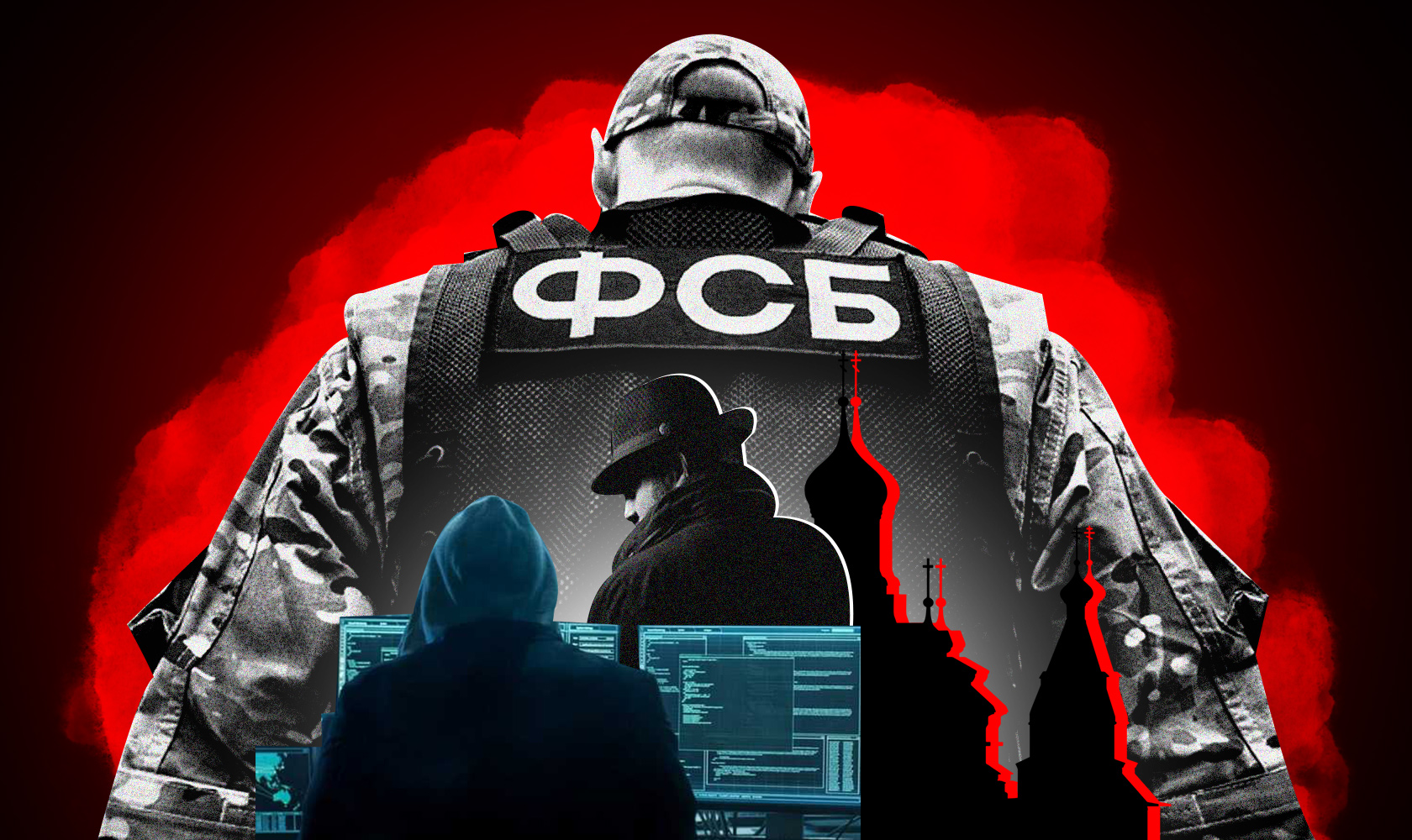
"Yakuza" is the word that Russian personnel in the occupied city of Berdiansk use for representatives of the FSB, adding, "We are the force, and they are the brain".
A mole in the SSU?
February 2023. A 53-year-old grey-bearded man in sportswear is brought into the Kyiv court, accompanied by guards.
The lawyers ask the court for permission to let him out of the cell so he can sit next to them. The judge allows it, saying, "Well, the man looks serious."
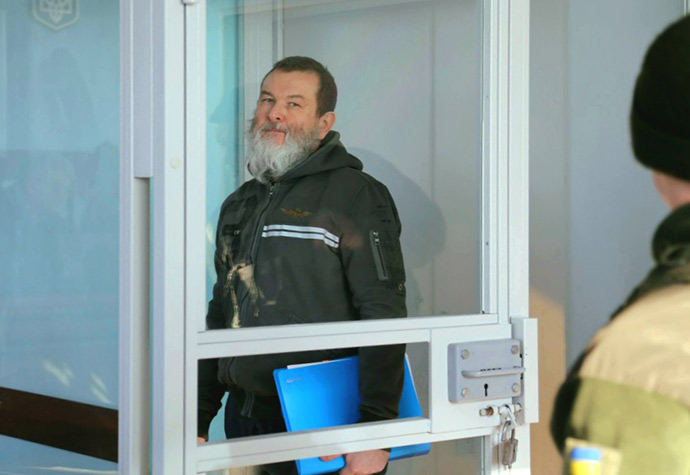
This man is Oleh Kulinich, former Head of the Crimean Security Service of Ukraine (SSU), who is suspected of treason. He has been in a Kyiv remand centre for six months, trying to appeal against his arrest, but to no avail.
Investigators believe that Oleh Kulinich was a member of a criminal group led by Igor Chumakov, Head of the 9th Department of the 5th Service of the FSB. Among the latter's "colleagues", the investigation identified several other FSB officers, particularly Alexander Chulindin and Marina Terentyeva. While working for the FSB, Kulinich passed intelligence to the aggressor country. The suspect denies this, saying he does not know these people.
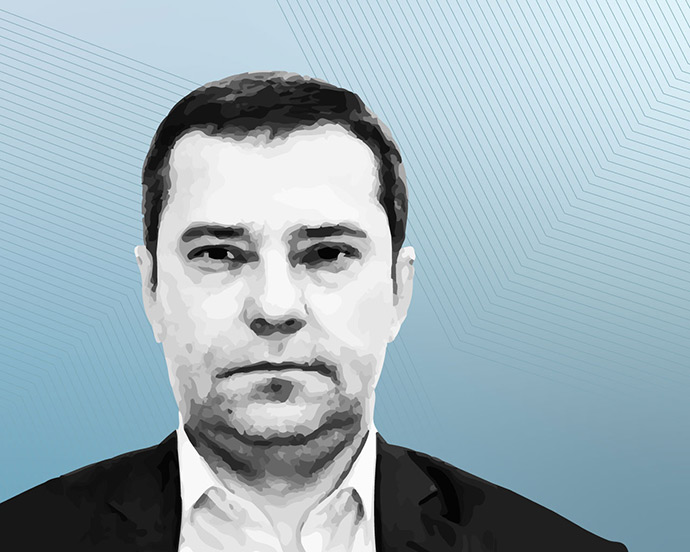
"I learned about the existence of Igor Chumakov, as well as the other representatives of the FSB of the Russian Federation, on 17 July from the text of the suspicion they served me with," Kulinich tells us. "I have never met, got to know or had any contact with any of them."
The investigation believes Kulinich did not need to be personally acquainted with Chumakov to be involved in the organised criminal group. According to the investigation, the Russians coordinated Kulinich’s activities through Volodymyr Sivkovych, a former Deputy Secretary of the National Security Council, former KGB officer, and a defendant in the case of the violent crackdown on participants in the 2014 Revolution of Dignity.
The SSU calls Sivkovych the "overseer of the Ukrainian question" for the Russian secret services.
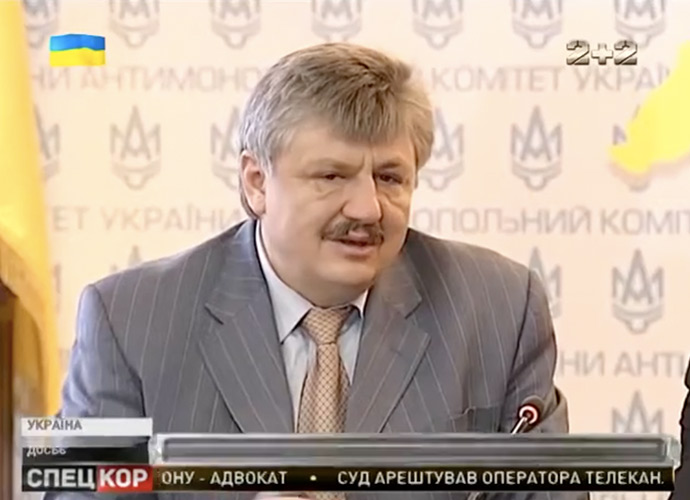
The SSU says that on the instructions of his Russian handlers, Kulinich concealed intelligence regarding Russia's plans to invade Ukraine from Crimea on 24 February 2022. The suspect claims that he reported all information to the SSU leadership and that the criminal case was opened due to several former subordinates’ testimony against him.
Among the key evidence for his guilt, the investigation cites audio recordings of conversations between the defendants in the case. They used ciphers and nicknames. Kulinich allegedly chose the nickname 'Kotyhoroshko' [a hero in an old Ukrainian fairy tale – ed.].
The court left Kulinich in custody. The suspect believes the audio recordings of the investigation were fabricated and insists he will prove that he is innocent of the accusation against him. Asked whether he might be exchanged for Ukrainian prisoners of war in Russia, he answers "No".
The structure of the "office" and the "Ukrainian question"
Aleksandr Bortnikov, 71, has been the director of the FSB continuously since 2008. He is also one of the security officials closest to the Russian president.
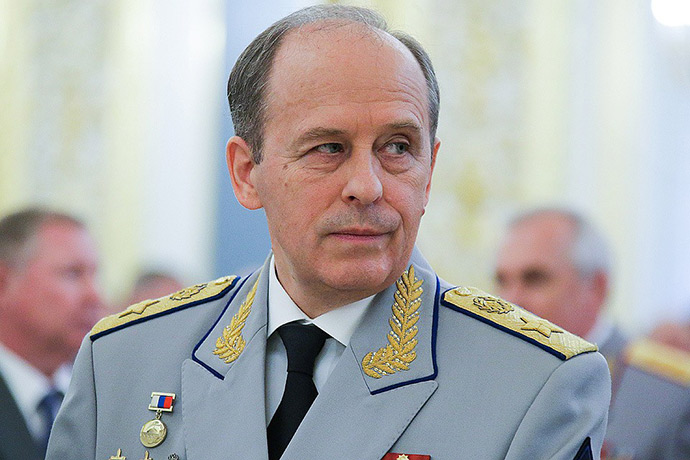
He has been in the Russian state security services for 47 years. Bortnikov has a background as an operative and has held senior positions in the counterintelligence units of the Soviet KGB and the Russian FSB.
Bortnikov was involved in a corruption scheme involving the alienation of land in the Resort District of St Petersburg on the Gulf of Finland worth a total of US$2.5 million. He has also been sanctioned by the European Union, Canada, Switzerland, Japan, New Zealand, the United States and Ukraine over the poisoning of opposition leader Alexei Navalny, the war against Ukraine, and the recognition of the self-proclaimed L/DPR [the Russian-backed Luhansk and Donetsk People’s Republics].
Structurally, the FSB consists of eight main branches, known as services: border guards; counterintelligence; international relations; economic security; personnel; protection of the constitutional order and counter-terrorism; scientific and technical; and monitoring.
The services that are most involved in Ukraine are the First Service (Counterintelligence), the Second Service (Protection of the Constitutional Order and Counter-terrorism), and the aforementioned Fifth Service (Operational Information and International Relations).
Fifth Service: International Relations
Ukrainian intelligence services consider Igor Kovalenko, 47, an officer in the Fifth Service of the FSB, to be the handler of pro-Russian politicians in Ukraine – in particular, Viktor Medvedchuk, a Ukrainian businessman to whose daughter Putin is godfather, and Illia Kyva.
The aforementioned Igor Chumakov, believed to be the handler of Oleg Kulinich, also works in this FSB department.
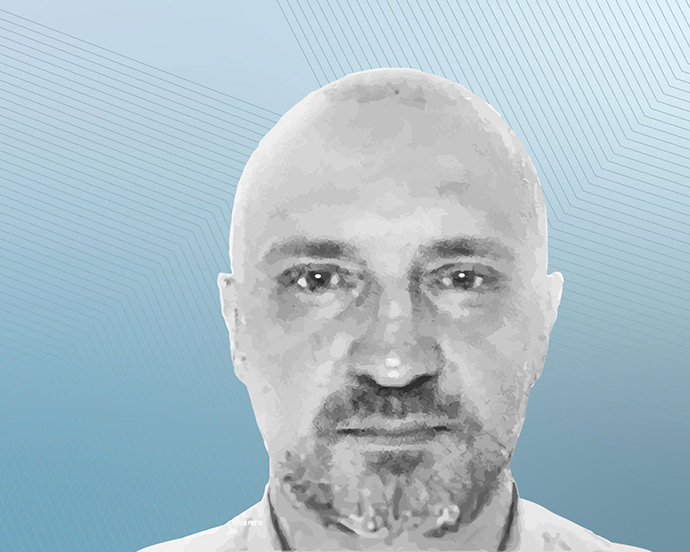
The FSB's Fifth Service for Operational Information and International Relations deals with the so-called "Ukrainian question". Its employees coordinate a network of agents in Ukraine from the Moscow office, structure and analyse the intelligence gathered, and develop plans for subversive operations.
Sergey Beseda has been the head of the Fifth Service since 2009. He has been with the FSB since 2003.
Beseda came to Kyiv in February 2014, ostensibly to provide security for the Russian embassy. Neither Ukrainian or Russian law enforcement agencies have yet disclosed the real purpose of his visit to Kyiv.
Instead, Ivan Lukashevych, a former SSU officer, said that during the Maidan [the 2014 Revolution of Dignity], FSB officers were even provided with escorts on the territory of Ukraine, including some from the SSU at the time.
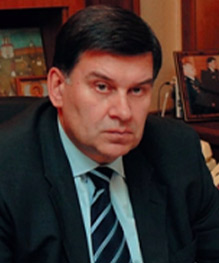
"They stayed in Koncha Zaspa [the area known for being the place where Ukraine's political elite live]," Lukashevych said. "Everyone is afraid to talk about this now, but it is an established fact that they were there, and it was probably them who provoked the first clashes on the Maidan and the killings of law enforcement officers. But they don't talk about it, as many of those Ukrainian officers have remained in the SSU and moved to other positions, and they are not interested in people investigating their role in these events."
Independent Russian journalists reported that after the start of the full-scale invasion, following the first defeats of the Russian army, Beseda was supposedly suspended from his duties and arrested. But Russia’s Investigative Committee has denied this.
Journalists from The Washington Post who investigated found that the staff from the Fifth Service had surged in size in the months leading up to the full-scale invasion of Ukraine.
First Service: Counterintelligence
The FSB's First Service, or counterintelligence, has been headed by Lieutenant General Vladislav Menshchikov since 2015. Menshchikov worked in the state security services from 1983 to 1995 before becoming the CEO of one of Russia's largest defence companies, Almaz-Antey Air and Space Defence Corporation. At the time of his appointment, Menshchikov was said to be close to the-then head of the Russian presidential administration, Sergey Ivanov.
One of Menshchikov's deputies is Dmitry Minaev. Ukrainian intelligence has named him as the main organiser behind the 2017 murders of two Ukrainian intelligence officers, Oleksandr Haraberiush and Maksym Shapoval.
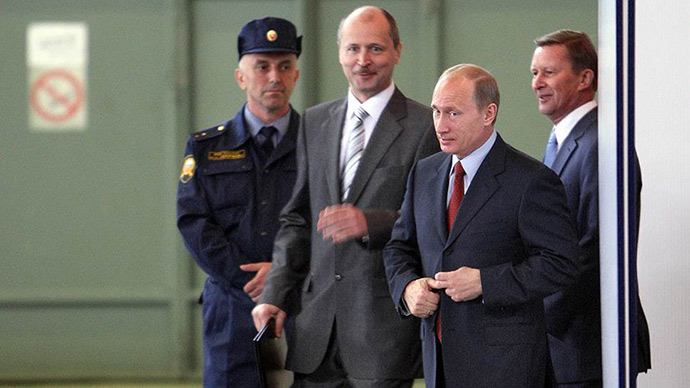
In 2020, SSU officers detained their colleague Valerii Shaitanov on suspicion of high treason, namely working for Igor Yegorov, an officer in the FSB's First Counterintelligence Service. According to the investigation, the latter recruited Shaitanov and gave him the nom de guerre 'Bobyl'.
Former SSU officer Ivan Lukashevych said that Yegorov had worked on Ukraine-related matters even before the 2013-2014 Revolution of Dignity, and in 2014, his tasks included persuading Ukrainian special services in Crimea to commit treason.
"Yegorov completed this task almost with distinction: he received a medal ‘For the Capture of Crimea’ for this," Lukashevych said.
The Information Security Centre, or 18th FSB Centre, is a unit within the First Counterintelligence Service. Most of the Russian cyberattacks on Ukraine are its doing.
The SSU calls ARMAGEDON (sic) one of the most powerful Russian hacker groups.
ARMAGEDON is a unit within the "Crimean" FSB which consists of career officers from the special services and former law enforcement officers of Ukraine. The main goal of Russian cyberattacks is to control critical infrastructure, steal and gather intelligence, exert informational and psychological influence, and block information systems.
According to the SSU, the number of Russian cyberattacks on Ukraine has more than tripled since the beginning of the full-scale invasion. "At the present time, the aggressor country is launching an average of over 10 cyberattacks per day," the SSU states.
Second Service: Protection of the Constitutional Order and Counter-terrorism
The FSB's counter-terrorism service is headed by Alexey Sedov. The SSU has accused the unit of carrying out provocations during the 2013-2014 Revolution of Dignity in Ukraine, including preparations to deploy snipers in 2014.
In Russia, this unit monitors the opposition and youth movements.
Andrii Tishenin, a representative of the Second Service, together with his colleague Artur Shambazov, abducted and tortured Oleksandr Kostenko, a Revolution of Dignity activist in occupied Crimea in 2015. Both are former SSU officers who defected to the Russian occupiers. They tried to torture Kostenko into confessing to an alleged attack on a Berkut policeman on the Maidan during the Revolution of Dignity. [The Berkut special police force was an elite riot police force renowned for employing brutal tactics, now disbanded – ed.] After three and a half years of imprisonment, the activist was released, and last year, a Ukrainian court handed down a guilty verdict in absentia to Tishenin and Shambazov for violating the laws and customs of war.
The victim, Oleksandr Kostenko himself, was unable to hear this news, because he went missing on 2 March 2022. During conversations we had before the full-scale war, Kostenko told us about alleged Ukrainian traitors who may have links to the Russian secret services.
The FSB office in occupied Crimea is partly made up of former SSU employees and other traitors. According to a list published in 2016, over 1,300 SSU officers sided with the Russian occupiers and joined the FSB. These are the people who persecute Crimean Tatars [the indigenous people of Crimea, forcibly deported by Stalin in 1944 – ed.] on the peninsula and abduct other pro-Ukrainian residents of Crimea.
Passwords, rendezvous, recruitment
Oleksii Sydorovych is another former SSU officer from Kherson Oblast who is currently being held in the same pre-trial detention centre as Oleh Kulinich. He is on trial for collaborating with Vitaliy Korol, an officer from the Fifth Service of the FSB.
According to the investigation, Andrii Hutor, a former Ukrainian special services officer, acted as a liaison between them. To maintain secrecy, they used special text encryption software.
Another court case involves an employee of the Cabinet of Ministers who was an FSB agent. According to the investigation, an officer of the Fifth Service offered him a reward of about US$10,000 in return for cooperation.
To keep their communication confidential, the Cabinet member was given a mobile phone by the Russian secret services with special pre-installed software called ViPNet Client, through which he would pass scanned documents on to the FSB.
Ukrainian law enforcement officers also discovered a network of FSB agents among the Ukrainian veterans that took part in the hostilities with Russia in Donetsk and Luhansk oblasts in 2014-2018. They had allegedly been collecting information on the movements of Ukrainian military personnel and had attempted to bring one of the former commanders of Ukraine’s Special Operations Forces to Russia. The Russian special services had offered a reward of US$100,000 for achieving this.
"Russian agents were preparing sabotage operations in Mykolaiv Oblast. Combat aircraft of the Ukrainian Armed Forces at the Kulbakino airfield were among their targets," the SSU said in a statement. The investigation established that the ex-servicemen were handled by FSB representatives Vadim Dautov and Denis Sobko.
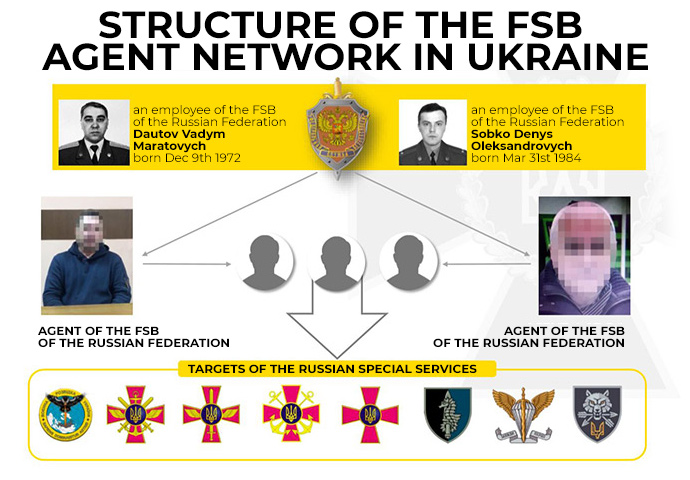
Another case concerns an active Ukrainian serviceman who cooperated with an FSB officer codenamed "Baikal".
"Using the Telegram messaging app, he provided the FSB officer with information about the rotation, movement and weaponry of units of the Ukrainian Armed Forces, data on troops and their morale, possible locations that would allow for discreet entry into the grounds of the military unit, and the locations of Armed Forces training grounds in Ukraine," the court materials state.
The agent had voluntarily signed a cooperation agreement with the FSB during a meeting with his handler in Novomoskovsk (Dnipropetrovsk Oblast) and passed them relevant coordinates on the map.
The priests also have much to answer for. So far more than 20 representatives of the Ukrainian Orthodox Church of the Moscow Patriarchate (UOC-MP) have been served with notices of suspicion. For example, according to the investigation, Metropolitan Ionafan [Yeletskih] of Vinnytsia, who studied with Kirill [Gundyaev], the head of the Russian Orthodox Church, had direct contact with representatives of the FSB. The metropolitan himself claims that he is "not an enemy of Ukraine".
Among the high-profile cases related to the secret services of the Russian Federation, it is worth mentioning the detention of Stanislav Yezhov, the interpreter for former Ukrainian PM Volodymyr Hroisman, who sent information to his FSB handler using the email address of one "Elena Prekrasnaya". There is also the case of the "assassination of Arkady Babchenko" [a Russian dissident journalist whose murder was staged by Ukrainian security services, apparently to foil a Russian assassination plot – ed.], which was directed by Viacheslav Pivovarnyk, allegedly on behalf of the Russian secret services.
The FSB’s work during occupation
The FSB officer in this photo looks very similar to the one who interrogated me in March 2022 in occupied Berdiansk.
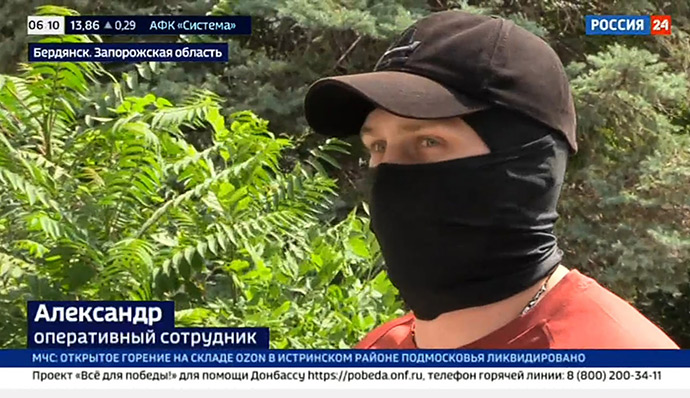
In a news story on a Russian TV channel, he talks in a modified voice about the "detention of particularly dangerous terrorists" who allegedly planned to commit a terrorist attack in the "liberated city" on the instructions of Defence Intelligence of the Armed Forces of Ukraine. The suspects were sent to the self-proclaimed Donetsk People’s Republic "for further investigative actions".
FSB representatives have unlimited powers in Ukraine’s recently occupied territories.
Within days of capturing the city, the FSB controlled all processes in Berdiansk: the appointment of "authorities", the suppression of pro-Ukrainian rallies, the selection of "journalists'' to release their propaganda, pressure on entrepreneurs and representatives of state bodies who refused to cooperate with them. Even now they continue to look for Ukrainian law enforcement officers and soldiers, demanding that they hand over their weapons, and detain local residents with a pro-Ukrainian stance. Law enforcement agencies such as the "police'' are also controlled by the FSB.
The occupiers in other occupied territories act in the same way.
In occupied Enerhodar, the FSB is engaged in persuading nuclear workers from the Zaporizhzhia Nuclear Power Plant to cooperate with Rosatom [Russian State Atomic Energy Corporation – ed.].
"My first meeting lasted 20 minutes. It was actually a monologue by an FSB officer who suggested that we should ‘be friends’ and tried to establish contact," says Andrii Tuz, a worker at the nuclear power plant who managed to leave the occupied city.
"During the second meeting, they put a chair in the middle of the room, surround [you] with soldiers, bang on the table, shout and make threats, and [they do it] quite convincingly.
Then they’d come to your workplace, intimidate your colleagues, take down addresses and telephone numbers. There were abductions. And then they’d say, ‘Friend, brother, let's work together!’ In other words, they go through several methods trying to work out which one you’ll respond to. The talks would last for an hour and a half."
In social media groups, people living in the occupied territories talk about SORM [System for Operative Investigative Activities – ed.], an FSB system for eavesdropping and tracking local residents. It is already being used in some cities in the so-called Luhansk and Donetsk People’s Republics, as well as in occupied Crimea, and is being implemented in newly captured territories.
SORM-1 can record telephone conversations in their entirety and by key phrases. For example, "explosive", "Security Service of Ukraine", "Putin". That is why the occupiers are jamming Ukrainian communications and imposing their SIM cards on local residents.
The so-called Phoenix network operates in the self-proclaimed Donetsk People’s Republic, Lugakom operates in the so-called Luhansk People’s Republic, Na Svyazi ("In Touch") in the occupied part of Zaporizhzhia and Kherson oblasts, with Phoenix from Donetsk also making its way there, and Volna ("Wave") in occupied Crimea.
With the help of SORM-2, the FSB can monitor calls and messages over the internet, as well as user search history. So, for example, they monitor Russian donations to help the Ukrainian army, the passing-on of information to the SSU about the movement of Russian equipment, etc.
Then you immediately become an "agent", a "terrorist", a "Nazi", a "criminal authority" to them. And until you admit it yourself (most often on camera), they rarely decide to let you go. The recording of videos of alleged confessions is another typical feature of how the Russian secret services work with detainees.
According to our information, FSB employees known by the aliases of Irbis, Berkut and Uragan were in the occupied part of Kharkiv Oblast. Local residents of the liberated city of Izium told us how they were interrogated and tortured.
"They checked the house, beat us up and took us away. The narrow-eyed one was the one who beat us," recalls local resident Oleksandr Komov. "There were seven of them in total. They arrived in a military vehicle with a machine gun on top and the letter Z on it."
Oleksandr was taken to an unknown place with a bag over his head. "The men who were interrogating me immediately introduced themselves: 'We are from the FSB,'" says Oleksandr. "They asked who I knew from around here, and asked about weapons. They kept me there for about an hour. I said I didn't know anything. I sat there for four hours, they took me out, dropped me off, took the bag off my head, and I went home."
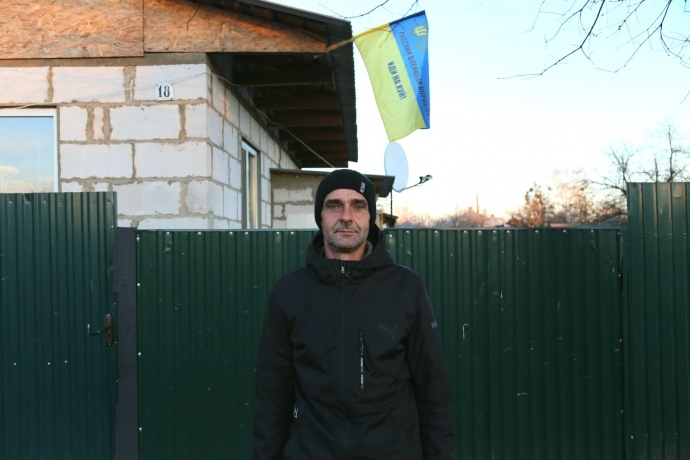
Yurii, a local resident, also tells us about his abduction and torture, showing his broken ribs.
"They asked me where the weapons were, where I hid them. And I said: ‘Throw them [the weapons – ed.] into my garden, and I'll go and show you them.’ I think it was pure sadism. Because the whole time I never understood what I was being detained for," Yurii says.
"I saw four [people] during the interrogation: two on the sides, one behind and an older one sitting in the centre. They were wearing balaclavas."
According to the SSU, the execution site in occupied Kherson was coordinated by Sergey Sinitsyn, an employee of the 5th Service of the FSB who goes by the alias of Sabir.
"As part of the so-called ‘temporary operational group No. 8’, he had an important role in setting up the Moscow-controlled ‘Main Department of the Ministry of Internal Affairs of Kherson Oblast’. It is this pseudo-formation that fulfils the Kremlin's task of carrying out mass repressions against the residents of the captured regions of southern Ukraine," the SSU reports say.
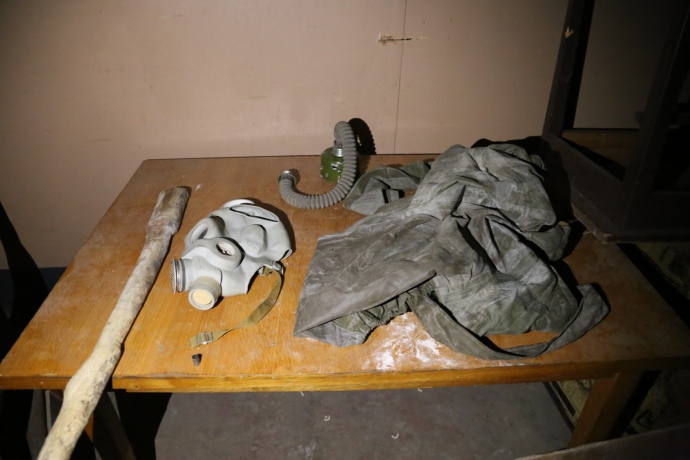
In addition, Sabir was involved in setting up a network of agents for conducting intelligence and subversive activities in the oblast, attempting to recruit former law enforcement officers and local officials.
***
They planned to "take Kyiv in three days", but they have failed to do so even a year after that.
Ukrainian intelligence believes that the plan failed in part due to the embezzlement of funds allocated to the FSB.
But the issue of "moles" and traitors within the Security Service of Ukraine and other state structures, both military and civilian, is still a key issue. After all, FSB agents, especially if they are in the management chain, can multiply the efforts of the Armed Forces by zero.
Viktoriia Roshchyna for Ukrainska Pravda
Translation: Artem Yakymyshyn, Oxana Hart and Theodore Holmes
Editing: Ivan Zhezhera and Teresa Pearce
Journalists fight on their own frontline. Support Ukrainska Pravda or become our patron!